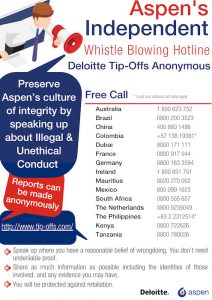Aspen Pharmacare Canada is committed to upholding the highest standard of business ethics.


At Aspen we regard our reputation as one of our most valuable assets, and to ensure that we maintain the trust and confidence of our stakeholders, we strive to do business with the highest levels of Integrity, beyond simply performing the minimum required by law.
In line with King IV recommendations, a formalised ethics & compliance management programme has been initiated at all of the Group’s businesses. This programme is managed by the Group Head: Ethics & Compliance, under the direction of the Board, and the Social & Ethics Committee and is aimed at:
- Assisting the Audit & Risk Committee and the Social & Ethics Committee in assessing the Group’s ethics and compliance profile, risks and opportunities; and
- Assisting the Social & Ethics Committee to monitor implementation and compliance with the Group’s policies which guide expected ethical and lawful behaviour.
The programme is focused on implementing the high standards of ethical and lawful business conduct that we have established for ourselves as a Group, and includes:
- Living our values whereby employees are guided by our Code of Conduct, and its supporting framework of policies and procedures, which are aimed at maintaining these high standards;
- Promoting ethical and legally compliant behaviour and leadership, both internally and in relation to third parties acting on Aspen’s behalf;
- Avoiding relationships, situations or engagements which may result in conflicts of interest, and to disclose these in line with the relevant policy provisions, when these conflicts cannot be avoided;
- Assessing and mitigating ethics, legislative compliance, and reputational risks;
- Training and communications to engage employees in applying our Code of Conduct and other policies and procedures which are relevant to ethics and legislative compliance;
- Maintaining an effective confidential whistle-blower service through which concerns about potentially unethical, unlawful or unsafe conduct can be reported (anonymously if preferred) and investigated; and
- Regularly monitoring and testing the programme in order to determine its effectiveness, that it is operationalised and embedded into Aspen’s day-to-day business, and that opportunities for improvement can be identified.
Aspen is a member of the Ethics Institute SA and a signatory to the UN Global Compact.
We thank our stakeholders for their support of this programme, in particular our employees for their continued commitment to ensuring that we uphold our value of Integrity and placing patients at the centre of our operations.
Kind regards
Stephen Saad
Aspen Group Chief Executive
The Group has appointed Regional Ethics & Compliance Officers who stakeholders can contact regarding any ethics or compliance queries.
Download the Aspen Regional Ethics & Compliance Officers contact details below:
 Aspen endeavours to promote a culture of openness and transparency throughout the Group. Employees and other stakeholders are encouraged to report unethical conduct and any transgressions of which they become aware.
Aspen endeavours to promote a culture of openness and transparency throughout the Group. Employees and other stakeholders are encouraged to report unethical conduct and any transgressions of which they become aware.
An independently monitored whistleblowing hotline, Deloitte’s Tip-offs Anonymous, is available to employees across the Group’s businesses, whereby employees can report suspected fraud and/or activities which are considered to be transgressions of the Group’s Code of Conduct. Tip-offs training and awareness sessions are conducted periodically to promote use of the facility where necessary.
The Tip-offs service has also been extended globally to customers and suppliers of Aspen’s businesses.
All logged calls are reported to Aspen’s Group Ethics Committee for consideration. Where wrongdoing, unlawful conduct or a breach of Aspen’s policies or procedures is identified, corrective action is implemented in all instances to improve controls and to prevent recurrence of the incident.
The PDFs below provide additional information required to raise any concerns about unethical behaviour at Aspen.
The Group Code of Conduct governs the conduct of all Aspen’s employees throughout the Group and is aligned with the Organisation for Economic Co-operation and Development recommendations regarding corruption. Furthermore, Aspen’s service providers and suppliers are required to adhere to the Group’s Code of Conduct in accordance with relevant clauses included in agreements with these stakeholders.
The areas covered by the Group Code of Conduct include:
- acting in accordance with Aspen’s values;
- equitable treatment for all;
- acting as ambassadors of Aspen;
- business integrity;
- gifts, entertainment and bribery;
- integrity of qualitative and quantitative information;
- protection and use of property;
- business controls;
- confidential information;
- insider trading;
- safety, health, quality and the environment;
- competition law;
- political activities;
- compliance;
- accountability; and
- corporate governance.
In line with King IV recommendations, a formalised ethics management programme has been initiated at all of the Group’s businesses. This programme is managed by the Group Governance Officer under the direction of the Social & Ethics Committee and is aimed at:
- assisting the Audit & Risk Committee and the Social & Ethics Committee in assessing the Group’s ethics profile, risks and opportunities; and
- assisting the Social & Ethics Committee to monitor implementation and compliance with the Group’s policies which guide expected ethical behaviour.
Aspen’s induction programme educates new employees on the ethics, values and the business philosophy of the Group. All new employees are given a copy of, and are required to sign an acceptance of, the Code of Conduct on commencement of their employment with the Group. The Code of Conduct is available to all employees on the Group’s intranet and is also contained in the employee handbook.
The Group conducts its business in a highly regulated environment, however, one in which the potential for unethical marketing and promotional practices remains inherent. Aspen endorses the ethical marketing of medicines and subscribes to the rigorous application of the Marketing Code of Practice of the Pharmaceutical Industry Association of South Africa. The Group has a written policy on gifts and benefits in terms of which employees of the Group, including directors, are prohibited from accepting or giving gifts or hospitality that are not of a nominal value or participating in events sponsored by current or prospective customers or suppliers. Any employee who receives a gift or other benefit exceeding the local currency equivalent of USD100 is required to disclose this in writing to the Company Secretary. Some types of gifts, benefits or entertainment are prohibited even if the value falls below this threshold. A Group-wide register of gifts is maintained by the Company Secretary and is noted by the Social & Ethics Committee on a periodic basis. This register is also made available for inspection by the Board or any member of senior management on request.
Aspen does not make payments or other contributions to political parties, organisations or their representatives or take part in party politics. Employees are free to participate in the political process in their private capacity provided it does not constitute a breach of the principles set out in the Code of Conduct and/or the relevant employee’s obligations to Aspen under contracts of employment and does not negatively influence their productivity or the credibility of the Group.
The Board has adopted a formal policy to regulate conflicts of interest and trading in the Company’s securities. The latter policy, which incorporates the requirements of the JSE Listings Requirements and the Securities Services Act, 2004 (as amended), prohibits any trade in the Company’s shares by any director or employee of the Group during a closed period. The Group currently has two formal closed periods, commencing 24 hours prior to the close of the interim reporting period (31 December) and the financial year-end (30 June) up to the end of 24 hours after the respective results announcement is made. In addition, the Group may declare other closed periods or restrict dealing in the Company’s shares at any other time if directors and employees have access to potentially price-sensitive information which is not in the public domain.
At all other times, directors (including directors of any of its material subsidiaries) and the Company Secretary & Group Governance Officer may only trade with prior written approval from the Chairman. Such approval is sought and co-ordinated through the office of the Company Secretary & Group Governance Officer. An announcement of all directors’ share dealings is published in compliance with the JSE Listings Requirements.
This statement provides insight into Aspen’s governance approach, risk assessment and mitigation strategy in relation to modern slavery and is aligned to our commitment to respecting human rights and the global legislative framework on modern slavery, including the UK Modern Slavery Act and the Australian Modern Slavery Act.
Aspen Group companies rely upon this statement, where necessary, for satisfying the disclosure requirements of the abovementioned laws, and any equivalent laws in the jurisdictions in which Aspen operates.
Download the Aspen Group Statement on Modern Slavery PDF below:
View the Aspen Forced Labour Report below:
